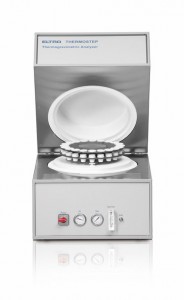Elemental analyzers are important tools for quality control of a wide range of products. A variety of matrices, such as ceramics, coal, steel or soil, can be analyzed for their element concentrations with different types of instruments. The product range of Eltra GmbH, located near Düsseldorf, Germany, comprises analyzers for C, H, N, S, O and thermogravimetry which allow for the standard-compliant determination of carbon in various chemical bondings, as well as oxygen and nitrogen in SiC and in materials containing SiC. The requirements which have to be fulfilled for a standard-compliant analysis may, however, vary greatly, depending on the desired parameters.

1 Introduction
Silicon carbide has a high melting point of 2,700 °C and is therefore an important raw material for refractory and ceramic products. Another characteristic of SiC is its resistance against chlorine and strong acids, also at high temperatures. Thanks to a hardness of 9.6 Mohs, it is also used in the metallurgical industry for the production of abrasives and polish.
The European standard series EN ISO 21068 (2008) regulate the chemical analysis of silicon carbide and raw materials containing silicon carbide. Part 1 deals with sampling, part 2 with the chemical analysis of carbon, silicon and loss of ignition and part 3 covers metal analysis and determination of oxygen and nitrogen concentrations.
Eltra combustion analyzers are well suited for the quality control of refractory and ceramic products which contain silicon carbide. This article outlines the possibilities and limits of elemental analyzers when dealing with these materials.
2 Thermogravimetric parameters
The determination of thermogravimetric parameters such as, for example, loss of ignition, is described in the second part of ISO 21068. Thermogravimetry is based on the continuous recording of mass changes as a function of a combination of time, temperature and atmosphere. The standard clearly defines the use of muffle furnaces and balances for this process. All methods described in the standard use a defined sample container made of steel, ceramic material or platinum which is pre-heated at the prescribed temperature between 250 °C and 1050 °C. The sample weight is not always defined (e. g. loss on drying LOD250) or ranges from 2 – 5 g to 1 kg (change of mass in air at 200 °C and 400 °C). After weighing the sample and applying the defined temperature program (e. g. for LOI850, heating up to 850 °C and maintaining for 3 h), the hot crucibles need to cool down in the desiccator and are then weighed.
Thermogravimetric analyzers which are equipped with a combination of furnace and balance considerably simplify the manual procedure. Usually, these analyzers have an interior chamber which can be heated up to 1,000 °C and a separate weighing cell in the analysis chamber which is connected with the furnace by a ceramic pedestal. A rotating carousel places up to 19 different samples, one after the other, on the pedestal to be weighed. The market offers thermogravimetric analyzers for both small sample quantities (e. g. 20 mg) and quantities of 5 g or more (such as Eltra’s Thermostep, fig. 1). By using an empty reference crucible, thermal buoyancy is compensated and measurements can be carried out reliably even at high temperatures. The ceramic crucibles usually have a volume of 12 ml, allowing for sample weights of up to 5 g. This, however, is not very practical due to the high filling level. So far, the DIN EN ISO 21068-2 standard does not mention automated thermogravimetric analysis.


